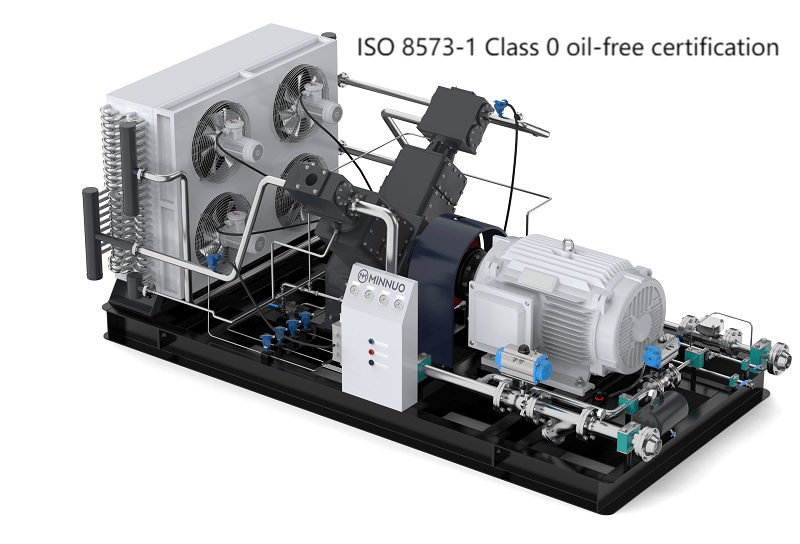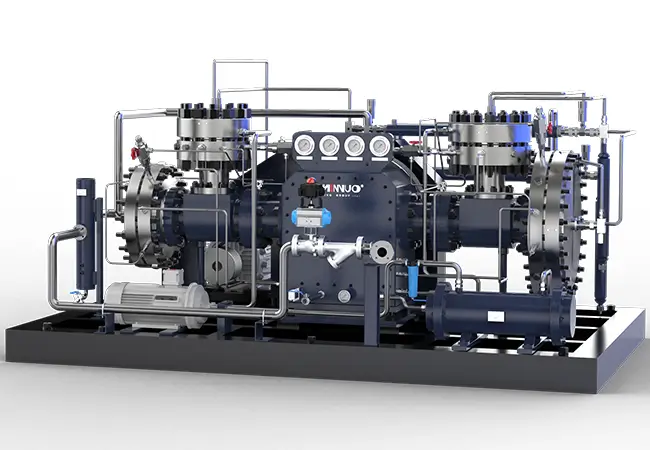In modern manufacturing, compressed air is as vital as the power supply. Industries from food processing and pharmaceuticals to electronics and automotive rely on clean compressed air to ensure product quality and reliable operation. This article explains the essentials of the ISO 8573-1 standard, why it’s essential to comply, and how meeting these requirements can help companies improve production efficiency and product quality.
The ISO 8573-1 standard is an internationally recognized compressed air quality specification that strictly limits the content of particulate matter, moisture and oil in the air to ensure air cleanliness in different industrial applications. As an air compressor manufacturer, MINNUO helps customers easily comply with the ISO 8573-1 standard through efficient purification systems, professional maintenance support and real-time monitoring. Complying with this standard can not only improve product quality and equipment life, but also save operating costs, reduce legal risks and enhance brand trust.
What is the ISO 8573-1 Standard?
ISO 8573-1 is a comprehensive standard set by the International Organization for Standardization (ISO) that defines acceptable levels of contaminants in compressed air. It is essential for ensuring that compressed air is clean enough for various applications across industries. The standard covers three major contaminants:
Particles
Dust, debris, and particulates from the environment or equipment wear can impact production processes and harm sensitive machinery. ISO 8573-1 categorizes particles by size and quantity, ensuring that air quality meets specific levels of cleanliness for various applications.
Moisture
Moisture in compressed air, whether in vapor or liquid form, can cause corrosion, clogs, and other problems that affect product quality and equipment efficiency. ISO 8573-1 sets moisture limits based on dew point to ensure the air remains dry enough for each application.
Oil
Oil contamination can come from compressor lubricants or environmental sources and is especially problematic in industries such as food and pharmaceuticals, where even trace oil content can compromise product safety. ISO 8573-1 sets strict limits on oil content to guarantee compliance with air purity requirements.
ISO 8573-1 defines different purity classes so that companies can choose the appropriate level of air quality for their industry and production needs, ensuring they meet the required standards for air cleanliness.

Why is it Essential to Follow ISO 8573-1?
Following ISO 8573-1 isn’t just about meeting a compliance requirement; it’s a proactive approach to ensuring quality, efficiency, and safety. Here are five key reasons why ISO 8573-1 compliance is essential:
Enhanced Product Quality and Safety
In sectors like food, beverages, pharmaceuticals, and electronics, product quality and safety are directly influenced by air cleanliness. Contaminants in compressed air can damage products and lead to defects. For instance, in food production, oil contamination compromises hygiene, and excess moisture in electronic production can cause short circuits. By following ISO 8573-1, companies can reduce the risk of product contamination, protect brand reputation, and meet customer expectations.
Reduced Maintenance Costs and Extended Equipment Life
Contaminants in compressed air are the “hidden enemies” of equipment health. Moisture, particles, and oil can build up in machinery, leading to blockages, corrosion, and increased wear. By using compressors that meet ISO 8573-1 standards, companies can reduce the frequency of equipment failures, extend the lifespan of their machinery, and save on maintenance costs.
Improved Energy Efficiency and Reduced Operating Costs
Clean compressed air systems are more energy-efficient because contaminants increase system pressure drops, forcing compressors to work harder. By following ISO 8573-1 guidelines, companies can operate at optimal efficiency, reduce energy consumption, and lower operating costs – all while achieving better air quality.
Compliance with Regulatory Requirements and Reduced Legal Risks
ISO 8573-1 is widely recognized as a baseline quality and compliance standard, particularly in industries like food and pharmaceuticals. Non-compliance can lead to legal consequences, fines, and even recalls. Our compressors are designed to meet ISO 8573-1, ensuring that companies operate within regulatory requirements, mitigate legal risks, and maintain competitiveness.
Improved Brand Image and Increased Market Competitiveness
In today’s market, transparency and accountability in the supply chain are more important than ever. Many clients prefer suppliers who can deliver ISO 8573-1-compliant air quality. Providing clean air that meets international standards enhances a company’s reputation, strengthens client trust, and provides a significant competitive advantage.
How to Ensure Compliance with ISO 8573-1?
To help our clients meet ISO 8573-1 standards, we incorporate rigorous air quality controls in the design, production, and service of our air compressors. Here’s how we ensure that our customers achieve compliant air quality:
Using High-Efficiency Filtration Systems
Our compressors are equipped with advanced filters, dryers, and oil separators that effectively remove particles, moisture, and oil. Customers can choose the appropriate filtration system according to their industry’s requirements, ensuring they achieve the necessary air purity levels in line with ISO 8573-1.
Professional Maintenance and Cleaning Support
Maintaining clean air quality requires regular maintenance and cleaning. We provide detailed maintenance guidelines and offer technical support, helping customers regularly replace and clean filters and dryers to ensure sustained ISO 8573-1 compliance.
Real-Time Air Quality Monitoring
Compressed air quality can fluctuate based on environmental conditions and operating parameters. To ensure consistent compliance, our compressors come with air quality monitoring systems that allow real-time tracking of particle, moisture, and oil levels. The system alerts the user if levels approach the threshold, enabling timely intervention to maintain ISO 8573-1 standards.
Long-Term Benefits of Complying with ISO 8573-1
ISO 8573-1 compliance brings many long-term benefits beyond simply meeting regulatory requirements. Here are some of the advantages of using air compressors that meet ISO 8573-1 standards:
Increased Product Quality
Clean air helps reduce the risk of defects, leading to higher-quality products and improved customer satisfaction.
Reduced Maintenance Costs
Clean air reduces the chances of equipment corrosion and clogging, minimizing downtime and repair costs.

Lower Legal Risks
ISO 8573-1 compliance ensures your operations meet industry regulations, helping avoid legal issues, recalls, and financial losses.
Enhanced Brand Image
Providing clean air in line with ISO 8573-1 shows clients and consumers that you are committed to high standards, building trust and strengthening your market position.
Conclusion
The ISO 8573-1 standard provides a comprehensive framework for ensuring the cleanliness, safety, and efficiency of compressed air in various industries. Compliance with this standard is a smart investment for any business that relies on compressed air for critical processes. As a leading air compressor manufacturer, we build our products to meet ISO 8573-1 standards, offering our customers a reliable source of high-quality compressed air.
With our advanced air purification technology, maintenance support, and real-time air quality monitoring, we help clients maintain ISO 8573-1 compliance with ease. Following ISO 8573-1 is not just about air quality; it’s a strategic step toward reducing costs, enhancing productivity, and protecting your brand.
If you have any questions about ISO 8573-1 standards or want to learn more about our air compressor products, please don’t hesitate to contact us. MINNUO is here to help you achieve the highest standards of air quality and efficiency.





 Email
Email sales:+86 15366749631
sales:+86 15366749631

